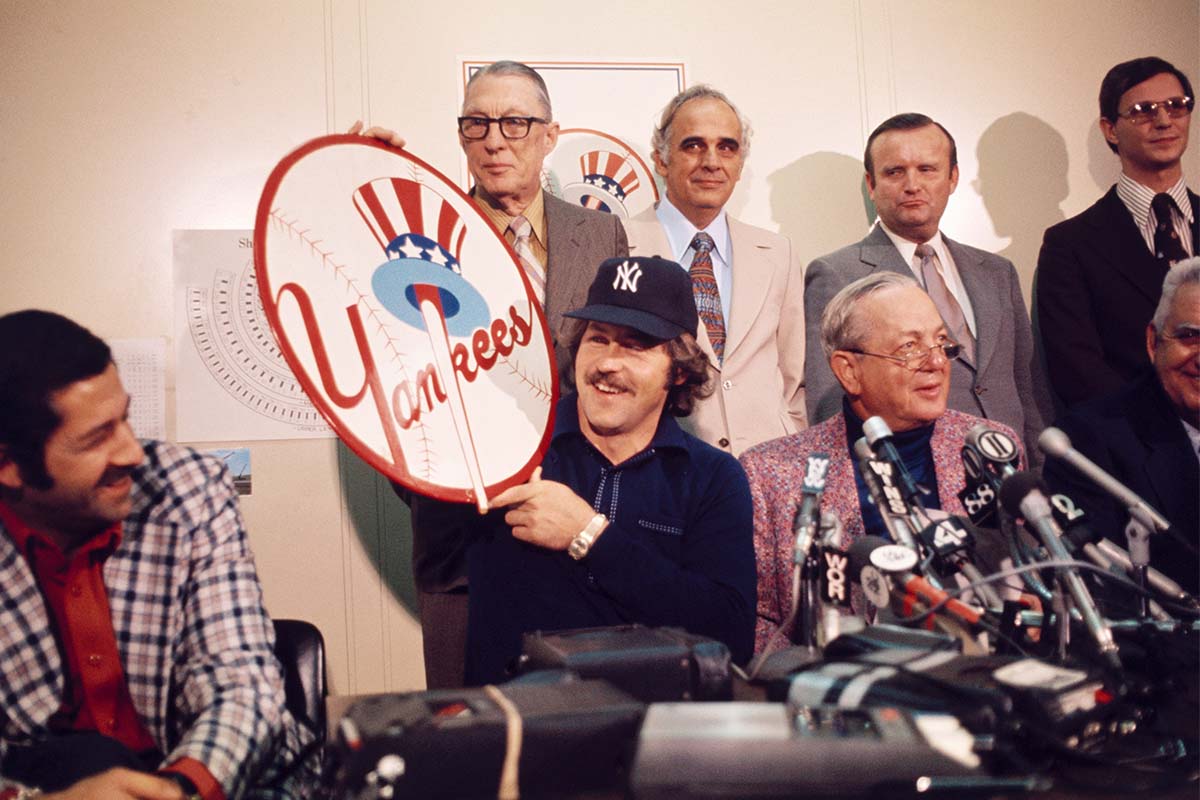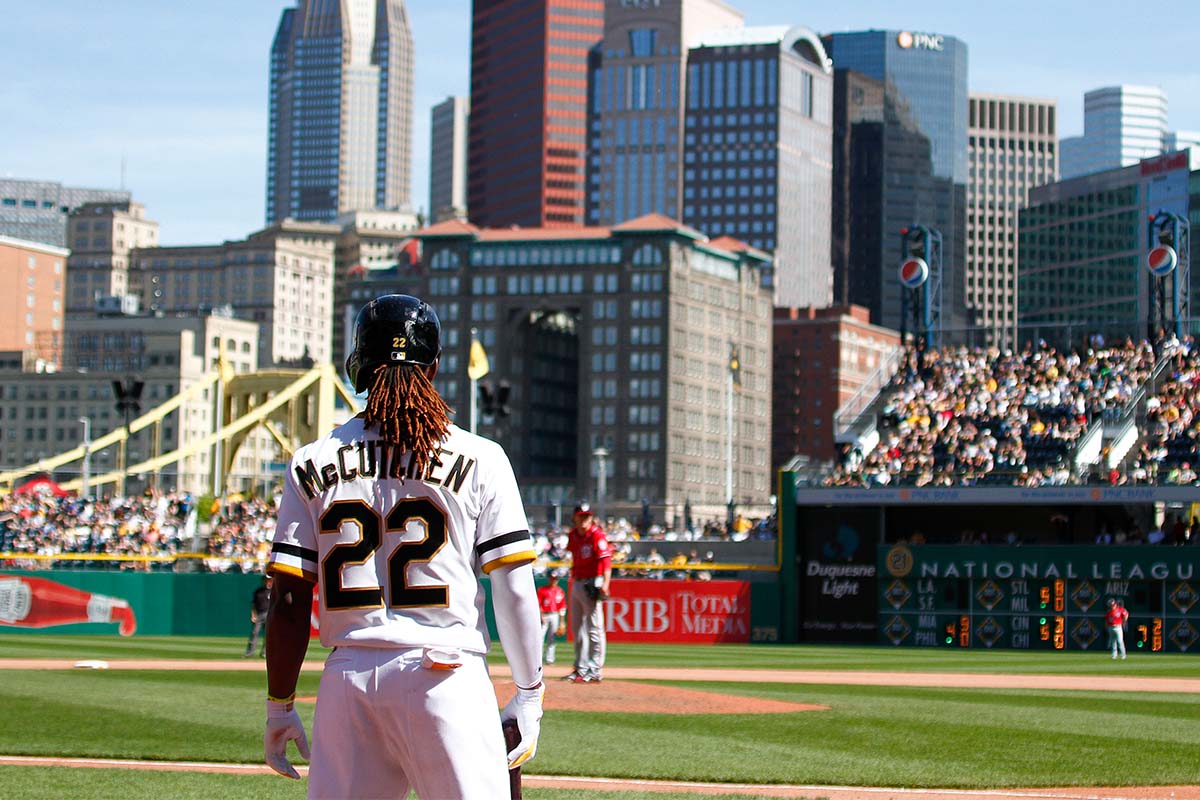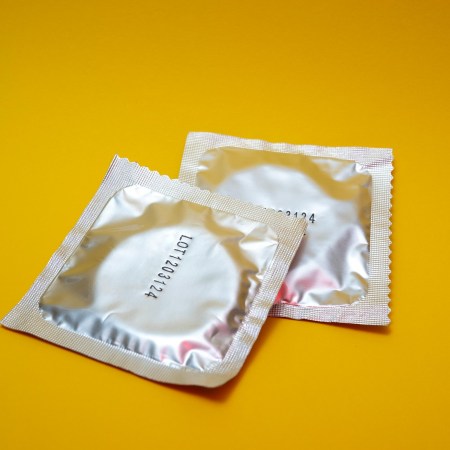During an appearance earlier this week on The Sports Bubble Podcast, Philadelphia Phillies outfielder Andrew McCutchen discussed his short stint with the New York Yankees in 2018, and the discomfort he felt with the franchise’s famous appearance policy. Like every other player who becomes a Yankee — McCutchen came to the ball cub via an August deadline deal with the San Francisco Giants — the five-time All-Star was expected to immediately trim his hair. McCutchen had officially cut his iconic dreadlocks years before, but he’d been sporting a beard with the Giants, and by the time he took over for an injured Aaron Judge in right field, his face was clean-shaven.
Two summers later, McCutchen doesn’t look back on the team’s code fondly. “I definitely do think it takes away from our individualism as players and as people. We express ourselves in different ways.” He also said that if he had still had his dreadlocks when he was traded to the Yankees, it would have been especially difficult for him to comply with the ordinance. “[That] was who I was,” McCutchen said. “That was how I expressed myself. That’s who made me Andrew McCutchen. That’s how people noticed who I was, it made me unique. I think, especially in this year, the year of 2020, I just feel like these things are, or should be, things that people should take at heart and realize that we have a way of expressing ourselves in different ways.”
The policy dates back to 1973, when George Steinbrenner (who had acquired the team that exact season) was having trouble making out the numbers on the back of players’ jerseys during the national anthem. Apparently, there was just too much hair in the way. Inspired by his time in a different sort of uniform (Steinbrenner served in the Air Force after college), he introduced a new code: “All players, coaches and male executives are forbidden to display any facial hair other than mustaches (except for religious reasons), and scalp hair may not be grown below the collar. Long sideburns and ‘mutton chops’ are not specifically banned.”
While Steinbrenner was alive, the Yankees won 11 pennants and seven World Series rings, launched the most lucrative regional sports network in the country, and became one of the world’s first billionaire sports franchises. Amidst all that success, the quirky team policy vacillated between goofy — certain players bent the rules to grow tremendous mustaches — and metaphorical, as a rallying cry for the club’s clean-cut, duty-bound approach.

The latter point is one I’ve heard repeated my entire life. I’ve been a diehard Yankees fan for over 20 years, and it’s clear to me that the majority of fans today either don’t think much about the appearance policy, or are inclined to support it. The Boss died a decade ago, but there are knowing grins from media and supporters whenever a fuzzy star comes to The Bronx. Welcome to the best franchise in sports, we do things a little differently around here. New superstar ace Gerrit Cole joked back in December: “I have experienced razor burn for the first time in 10 years.” Everyone’s favorite example? Back in 2005, Johnny Damon had his locks cut for $90 at an Upper East Side salon.
Sometimes, though, the attention isn’t so playful. Team prospect Clint Frazier, who has a vibrant Twitter personality and was featured in The Undefeated and Complex for his extensive custom cleats collection — he literally plays in Jordans — had to answer questions about his long and curly red hair (which probably violated team policy; it was right on the borderline) for an entire spring before, exhausted, he gave up and cut it. While Frazier’s career hasn’t exactly taken off yet, mainly due to a glut of of outfield talent in the Bronx, it seemed strange at the time to effectively tone down the public persona of a young, popular prospect — especially when MLB at large is desperate to attract a bigger Gen Z audience.
It isn’t the first time that the Yankees have had to drop the hammer down on a “misbehaving” (however mildly) player, either. In 1991, Don Mattingly was fined repeatedly and even benched until he trimmed his hair to team standards. He was batting .305, which makes Steinbrenner’s decision head-scratching enough, but beyond that, he was serving as team captain at the time. In the nearly three decades since, debates over the policy have risen and rattled around for a bit before again falling by the wayside, but something about McCutchen’s comments, and the exact moment at which they arrive, feels different.

During his podcast appearance, McCutchen also said, “I definitely do think [the policy] takes away from our individualism as players and as people … I feel like maybe there should be some change there in the future — who knows when — but it’s just one of the many things in this game that I feel that there just needs to be talked about, and to be addressed.”
He’s right to speak out on this. In 2020 — especially in 2020 — there is no good reason for the Yankees to force players, at risk of reduced playing time, fines or repetitional injury, to present themselves a certain way. We’re not talking about insensitive tattoos (which, by the way, a kicker for the New England Patriots recently, rightfully, had to get rid of); we’re talking about hair, about whiskers and curls. Compelling employees to groom themselves in an apparent effort to improve focus or performance, banks on an outdated, since debunked conceit decreeing that corporate structures thrive on quiet conformity. It is no coincidence that videos of Yankees players training in the offseason invariably show them training in Southern California or the Dominican Republic with full beards.
Remember: when the Red Sox (I can’t believe I’m writing this) came back from a 3-0 deficit in the 2004 ALCS and went on to break their 86-year title drought, they looked like a team of Geico cavemen, and even nicknamed themselves “The Idiots.”
A huge part of this, of course, is narrative, and the Yankees have long played theirs well, as the buttoned-up, pinstriped juggernaut. But the team has gotten younger and sillier in recent years, in a truly refreshing way, and current owner Hal Steinbrenner, along with team president Randy Levine, would be wise to reconsider the continued enforcement of George Steinbrenner’s early-’70s PSA. Simply ignoring McCutchen’s comments feels fraught, considering he’s one of the most prominent Black stars the game has had since Barry Bonds. Several athletes, most notably LeBron James, have noted the uncomfortable analogy between the power structure of North American sports leagues — Black labor, white owners — and the plantation system that built the United States. There is no direct, obvious or easy link between systemic racism and one team’s insistence that players keep a clean appearance, but it’s an uncomfortable and unnecessary dynamic regardless, in an age when we’re scrupulously reexamining long-held traditions.
Consider, for instance, that Los Angeles Dodgers star pitcher David Price, also Black, went on record years ago saying he wouldn’t play for the Yankees as long as the policy was in place. (Which is saying something. He has a career 6.15 ERA against the team, and he could’ve made his life easier at points had he simply joined them.) And consider the recent Instagram post from Colorado Rockies infielder Ian Desmond, who is sitting out this season. Speaking out on the murder of George Floyd, and a life in baseball as a biracial man, he pointed out the lack of Black people in elevated positions throughout the sport; there are only two Black managers, one Black GM and zero Black majority team owners in Major League Baseball.
And consider the fact that hair, particularly at the intersection of Black culture and America, is inherently political, a longtime symbol of otherness that has steadily been reclaimed an an emblem of pride and resistance. Among other traits, European slavers cited the unfamiliar texture of African hair styles as justification for the atrocities committed in the triangular trade. Jesse Jackson grew out his afro after Martin Luther King, Jr., was assassinated. Colin Kaepernick grew out his before he began protesting police brutality. Solange Knowles sings a song titled “Don’t Touch My Hair.” In February, a seven-minute film called Hair Love, in which a young Black girl named Zuri tries to come to grips with her thick hair, won an Oscar for Best Animated Short Film at the Academy Awards.
When Andrew McCutchen suggested that the Yankees’ appearance policy should be reconsidered, he didn’t invoke these stories. He didn’t explicitly point to Black hair’s centuries of struggle, and recent decades of celebration. But he shouldn’t have to: a corporate entity like the New York Yankees, which has become an economic and sporting behemoth thanks to the backs and home runs of Black athletes, needs to be proactive in recognizing a disconcerting display of authority over employees.
It’s possible the Yankees may never have a Black athlete who feels truly strongly about this. They may never field anyone who’d like to grow out dreadlocks — whether to catalyze personal branding opportunities, or make a social statement — similar to those that made McCutchen so iconic in Pittsburgh for nine years. But the only way of guaranteeing that can’t happen is to keep this policy going.
All power to McCutchen for addressing this issue (and before you start booing, Bleacher Creatures, he said in the same interview that playing for the Yankees was “an honor,” and an opportunity he’d always wanted). Yankees executives, for their part, said in 2013 that they will never change their appearance policy. Time will tell. A few other franchises around the country have made similar proclamations that could be overturned in the next couple months. If they do end up moving in a different, freeing direction, the purists shouldn’t worry too much. The Yankees still wear pinstripes. Anyone who hits even a ground-rule double in a clutch situation will have their number retired someday. And John Sterling isn’t done screaming about wins just yet. They’ll be fine, and the players, hopefully sometime soon, will be able to let their hair down.
The Charge will help you move better, think clearer and stay in the game longer. Subscribe to our wellness newsletter today.
























